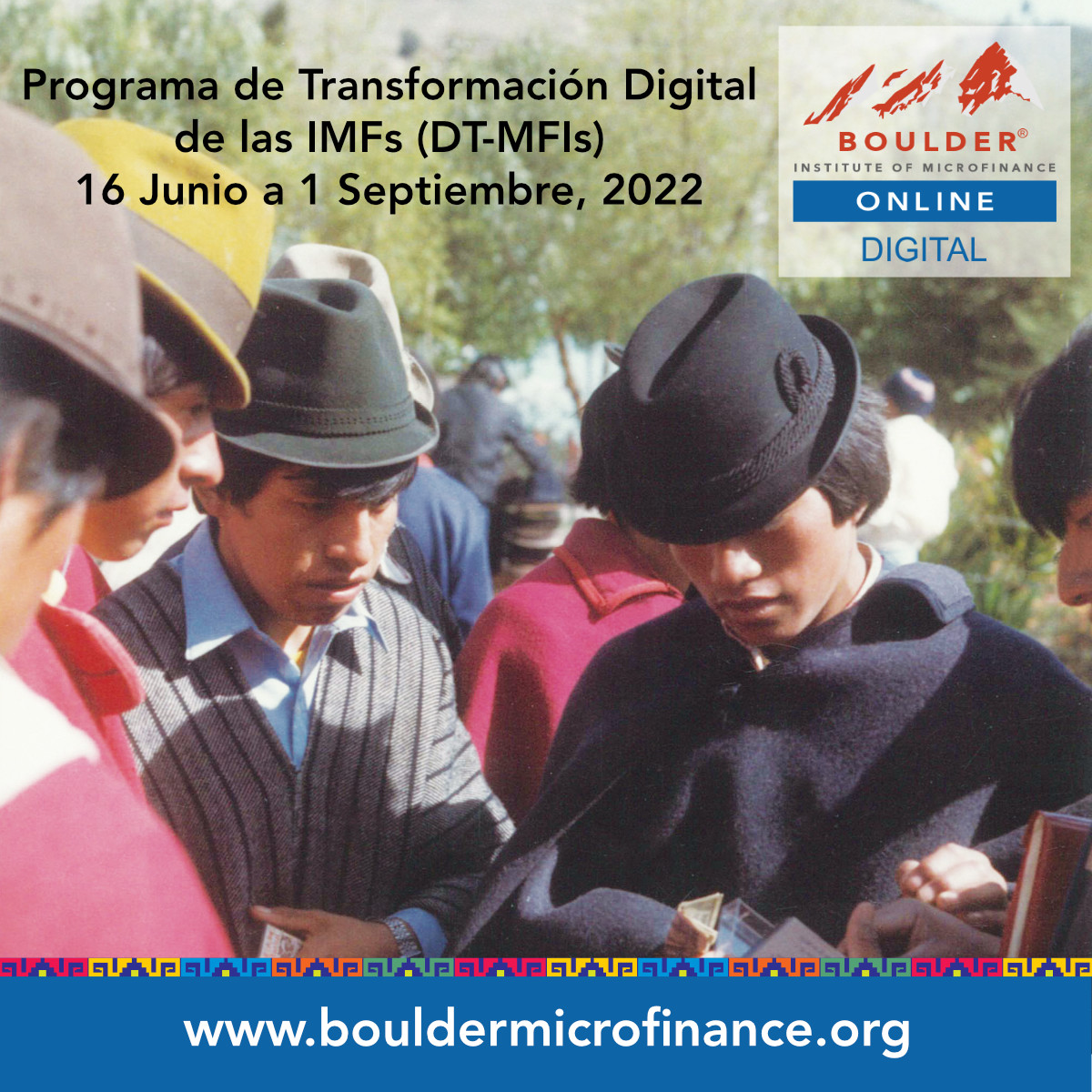Programa de Transformación Digital de las Instituciones de Microfinanzas
The microfinance industry has been going through challenging times due to Covid-19. MFIs (Microfinance Institutions) not only need to survive but also to succeed, and digital transformation helps achieve this objective. With 28 years of microfinance training experience, the Boulder Institute is launching a SPANISH ONLINE version of our DIGITAL TRANSFORMATION OF MICROFINANCE INSTITUTIONS PROGRAM (DT-MFIs) with a full set of the fundamental concepts our organizations need to deepen our commitment to serving our clients more completely.
Participants in this Digital Transformation of Microfinance Institutions Certificate Program will obtain a thorough understanding of the key ingredients in any pathway toward digital transformation. After this program participants will be able to help guide their organizations to put together a digital ecosystem, as well as develop agile design teams and processes.
We specifically designed this program around the challenges MFIs face when they move from analog to digital systems. This transition allows them to strengthen their relationships with clients in a digital age through the creation of hi-touch, hi-tech business models.

![]()
CONTENT
Módulo 1. Pasos estratégicos en respuesta a los impactos de COVID-19 y la evolución de nuestros mercados
Junto a Martin Spahr del IFC, revisaremos la respuesta estratégica que ha tenido el sector a los impactos del COVID-19 y la evolución de nuestros mercados. Una de las respuestas principales es el acelerado proceso de digitalización en la prestación de servicios financieros, en las operaciones de las IMF y en el ecosistema en que éstas operan.
- Robert Christen
Módulo 2. La organización centrada en el cliente
In this Module we look at transition to becoming a client – centered organization as part of the process of digital transformation. MFI’s that develop the ability to support client’s financial lives are more likely to emerge from the pandemic years prepared for challenges of an increasingly digitalized eco-system.
- Carlos Silis
Módulo 3. ¿Cómo maximizar el uso de información acerca de clientes y/o prospectos para generar innovación, eficiencia y una mejor experiencia para el cliente?
Digital Transformation can transform the business model MFIs use. We will explore the use of data in three broad applications: a) Improving operational management, b) A better understanding of clients (for example, through segmentation), and c) Predictive modeling.
- Carlos Fonseca
Módulo 4. ¿Cómo generar ingresos adicionales a través del análisis de los datos?
In this module we will understand the essential ingredients MFIs need to build a data management system. This system must be able to react quickly to a changing competitive environment. It must allow for a diverse and evolved set of financial services alongside an intensified, personalized, and highly connected relationship between field staff and clients. And it must support the MFI’s commercial goals.
- Dagoberto Cereceda
Módulo 5: Gestión de un modelo de microfinanzas ‘Hi tech – Hi Touch’
This module centers on the creation of a culture of constant innovation, with clients at the center. We will focus on the organization and management of the human resources that are necessary to achieve an organization that is both a ‘best place to work,’ as well as one that achieves excellent client service.
We will be joined by Soledad Obando, who built Banco Estado’s Microenterprise program which has been highly digitalized from its very beginning more than 25 years ago and Gabriela Eguidazu from Bancamia who has a long experience and is in charge of their digital transformation initiatives.
- Robert Christen
Módulo 6. Ciberseguridad: ¿Cómo construir y mantener la confianza de nuestros clientes?
The course will guide participants in gaining a holistic understanding of cybersecurity from frameworks through psychology and behaviors. A specific focus will be examining the issues that are specific to Digital Financial Services and mobile money services for MFIs and their clients in developing markets.
- Salvador Chang
- Giannina Razuri
Módulo 7. Transformación digital de la IMF tradicional
In this Module we will examine case studies of two major retail corporations who went through a digital transformation process, that produced dramatically different outcomes. We will draw lessons from their experiences for financial services providers. We will look at factors that determine successful adoption, and how to ensure that these processes have the support they require from the very top of the organization.
We will be joined by Alejandro Gumucio (BancoSol, Bolivia) who will provide a discussion of his own experience within the microfinance field during the Live Session of this Module.
- Lucy Lawrence
Módulo 8. Organizar el proceso de transformación digital
In this Module we will look at how major MFIs organize their digital initiatives simultaneously with managing their bricks and mortar operations. We will quick look at modern design processes such as ‘Agile’ and how to manage these in conjunction with traditional methods.
- Oscar Guzman
Módulo 9. Marketing para el crecimiento
This Module will set us back on the path to thinking about exponential growth through marketing in a digital age now that we have developed our capabilities in rapid design and deployment of new products and operational processes.
- Fernando Trueba
Módulo 10. Mirando al futuro en la era digital
This module will look forward to the emerging digital eco-system for the provision of financial services as revealed by where private venture funds are investing their energy and funds. We will use a Harvard Business Case to illustrate key concepts.
- Lucy Lawrence
Faculty
Boulder Institute programs bring together faculty that include some of the most noted leaders in the field of microfinance to engage microfinance professionals in learning about innovative issues, core principles, and the latest techniques for providing access to financial services for the world’s poor.
Faculty bios
This Program will be led by Robert Christen with invited senior faculty who will drive the content and activities of each Module.
![]()
